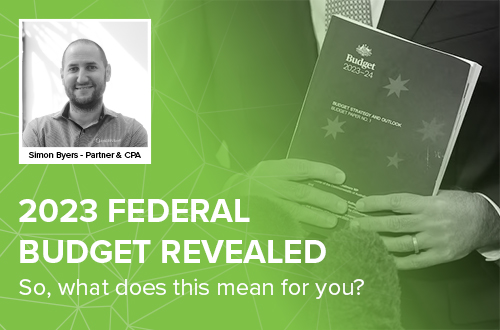2023 FEDERAL BUDGET REVEALED – So, what does this mean for you?

In May this year, Treasurer Jim Chalmers delivered the highly anticipated 2023 Federal Budget. Simon Byers, Partner and CPA of our Prahran office has reviewed the nitty gritty details to provide a summary of the key changes announced that will affect Individuals and Businesses.
This is the first annual budget in 15 years that the Federal Government has delivered a surplus – Labor reaching a surplus of $4b in 2022–23. In large, this is thanks to the significant revenue gained from income tax, concerningly the record low unemployment rate of 3.5 per cent, a lift in wage growth along with the return of migrant workers to Australia’s shores, and a monster tax revenue windfall from mining royalties.
However, with government debt currently at $548.6b, it’s a short-lived surplus.
Future government debts are expected to blow out to nearly $1 trillion by 2027 due to the rising costs of the NDIS, healthcare, defence spending pressures and the ballooning cost of aged care. As our population grows older, aged care has been a key funding focus and the budget confirmed funding allocation for a 15 per cent wage boost for aged care staff, decided by the Fair Work Commission in 2022, totalling $11.3b over four years.
I must admit, there was very little in the budget for small business and a lack of tax reform changes. The focus this budget was more on assistance to individuals in the form of increases to JobSeeker, Youth Allowance, Austudy, Single Parenting Payments, as well as higher Medicare benefits and some cost-of-living relief measures.
It’s not all good news for individuals however, with the Low to Middle Income Tax Offset ending on June 30,2023, meaning your 2023 tax return could be up to $1,500 lower than it was in 2022.
In summary – what does this budget mean for you?
Individuals
- Increases to Childcare Subsidies – for families earning less than $80,000 the subsidy will climb to 90 per cent. Some other families could see a lift to their subsidy of up to 2 per cent.
- Energy Price Relief Plan – $1.5b allocated over 5 years to help eligible households and businesses with targeted energy bill relief.
- Household Energy Upgrades Fund – an incentive to provide low-cost finance and mortgages for home upgrades that save energy.
- Single Parenting Payment – single parents will benefit from a higher payment from the Government but also receive it for longer, with the dependant’s cut-off age increasing from 8 to 14 years of age.
Businesses
- Instant Asset Write Off – has been extended again, but dramatically reduced from no limit to a per item limit of $20,000. So, if you are buying new equipment and items that are over $20,000 each, ideally you purchase them promptly, install them and make sure they are ready for use prior to June 30 this year, to be eligible for the higher limit tax deduction.
- Small Business Energy Incentive – this bonus tax deduction will provide businesses an additional 20 per cent deduction on spending that supports electrification and more efficient use of energy.
Superannuation
- Removal of 15 per cent Tax Concessions – from 1 July 2025, earnings on balances exceeding $3 million will pay tax on earnings at a rate of 30 per cent, 15 per cent higher than the current rate of 15 per cent. Earnings on balances below $3 million will continue to be taxed at the concessional rate of 15 per cent.
- Super Guarantee Increase Continued – scheduled to increase as previously legislated from the current 10.5 per cent to 11 per cent from 1 July 2023. Then increased again to 11.5 per cent from 1 July 2024 and 12 per cent from 1 July 2025.
Get in touch – we’re here to help!
As always, if you have anything that concerns you regarding the budget announced, or need some clarification please reach out to your trusted Highview Advisor who is here to help.
We sincerely wish you the best for what may be a tough economic year ahead.
Simon Byers
Partner & CPA
Highview Accounting & Financial, Prahran